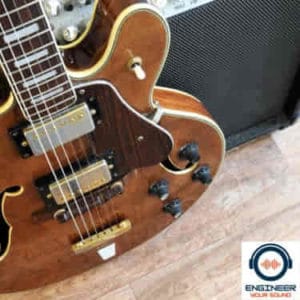As a seasoned guitarist, I’ve had my fair share of experimenting with different guitar equipment, and one aspect that’s captured my attention over the years is the impact of speaker size on tone.
From small 8″ speakers to larger 15″ guitar speakers, I have tried them all and can confidently say that, guitar speaker size does affect tone.
Guitar speaker size affects tone by influencing factors such as low-end response, harmonic complexity, and dispersion. Larger speakers reproduce more low-end frequencies, producing warmer and fuller sound. Smaller speakers can be punchy and focused, especially in smaller venues.
The size of the speaker cabinet and its dimensions also play a role in shaping the overall sound.
There is no such thing as “the best size” guitar speaker for tone, as it does depend on individual preferences. However, the most commonly sized guitar speakers are 10″ and 12″.
In this article, I will share my experience working with different guitar speaker sizes and how I find speaker size impacts tone.

How Does Guitar Speaker Size Affect Tone?
The effect of guitar speaker size on tone comes down to the qualities of sound that different-sized speakers can reproduce.
Bigger speakers, such as 12″ or 15″, often produce a deeper, more resonant bass response, which lends a “fuller” quality to the sound. They also tend to have a spacious, open feel to the upper mid and treble frequencies, offering a broad, room-filling sound. This can lead to a sense of warmth, depth, and complexity in the guitar’s tone, which is highly desirable for certain styles of music.
On the other hand, smaller speakers, like 8″ or 10″, provide a tighter and more focused bass response, often with more emphasis on the midrange frequencies. This results in a “punchier,” more defined sound that can cut through the mix in a band situation, making them highly effective for genres that require precision and clarity, such as funk or punk rock.
Also, the speaker size impacts the dispersion of sound. Larger speakers will disperse sound waves over a wider area, while smaller speakers tend to focus sound in a narrower beam. This can affect how the guitar sounds to the audience and how much of the guitar’s tone you hear when standing directly in front of the amplifier.
It’s important to remember that these are general observations, and the effect on tone will vary based on other factors, such as the speaker’s design, the cabinet it’s housed in, and the guitar and amplifier you’re using.
What Size Speaker Is Best For A Guitar?
Identifying the “best” speaker size for a guitar isn’t a one-size-fits-all answer. It largely depends on the style of music you play, the venues in which you perform, and the tonal qualities you prefer in your sound.
For instance, if you’re a blues or jazz player who craves a rich, full-bodied tone and typically performs in larger venues, a 12″ (or 15″) speaker might be your best bet. These bigger speakers are great at reproducing lower frequencies and provide wide sound dispersion, filling larger spaces without much effort.
In contrast, if you’re into rock, punk, or funk music and need your guitar to cut through the mix with crisp, clear mids and highs, you might prefer the tight, focused sound of an 8″ or 10″ speaker. The narrower sound dispersion of these smaller speakers also works well in smaller, intimate venues where the audience is closer to the stage.
Remember, this is subjective, and a lot depends on your personal preference. The best way to decide is to try different guitar speaker sizes and listen to how they influence your guitar’s tone. Doing so lets you find the right balance that works for your playing style and tonal preference.
I recommend a 10″ or 12″ speaker if you are unsure. Most great guitar speakers are in this size range and sound great.
Best Guitar Speaker Size For Genre
Here is a basic guide to the best speaker sizes for the ten most popular guitar music genres. But remember, these are general suggestions, and the best way to find your personal preference is through experimentation with different settings and gear.
- Blues: Blues players often prefer the warmth and fullness of 12″ or 15″ speakers. They reproduce the lower frequencies well, making for a rich, full-bodied tone.
- Rock: Rock music typically requires a speaker that can handle distortion well and deliver a punchy, midrange-focused sound. For this, 10″ or 12″ speakers are commonly used.
- Country: Country music often involves clean, twangy tones which can be produced excellently by 10″ speakers.
- Jazz: Jazz guitarists usually prefer the deep, warm tones that come from 12″ or even 15″ speakers. These larger speakers deliver a smooth, rich sound that suits the complexity of jazz chords and melodies.
- Metal: Metal music demands speakers that can handle high gain and produce clear, tight tones even at high volumes. A 12″ speaker is typically preferred in this genre.
- Reggae: The laid-back, bass-heavy sound of reggae is best served by larger speakers, typically 15″ ones.
- Funk: Funk requires clear, percussive sounds that cut through the mix. Smaller, 10″ speakers are usually capable of delivering this.
- Punk: Punk music thrives on raw, energetic tones. The punchiness of 10″ speakers can help deliver this sound effectively.
- Pop: Pop music needs a versatile speaker that can handle a variety of sounds. A 12″ speaker is typically a good fit for this genre.
- Classical: For the nuanced tones of classical guitar, a larger speaker such as a 12″ or 15″ can reproduce the wide dynamic range and complex harmonics beautifully.
Does A Bigger Speaker Mean Better Sound?
A common misconception is that a bigger speaker equates to a better sound. While larger speakers do tend to produce a richer, fuller tone with deeper bass response, they may not always be the best choice for every tone or style.
For example, a smaller speaker might be your best bet if you’re playing music that requires a more defined, punchy sound with an emphasis on midrange frequencies. The key is to identify what sound qualities you need for your specific music style and personal tastes and then choose a speaker size that can deliver those characteristics.
Remember, there’s not necessarily a “better” or “worse” when it comes to speaker size – simply different sound qualities. So, bigger isn’t always better; it’s about finding the right fit for your sound.
I have 10″ and 12″ guitar speakers in my collection. I use the 10″ speakers with my Fender Telecaster for playing clean and focused tones, and I use the 12″ guitar speakers with my Gibson Les Paul for deep-driving distorted riffs.
Are 12″ Speakers Louder Than 10″ Speakers?
The question of whether bigger speakers are louder is a common one, and the answer isn’t as straightforward as you might think.
Indeed, larger speakers, like 12″ ones, can move more air than smaller 10″ speakers, which can result in a perception of more volume.
However, the loudness of a speaker is also heavily dependent on other factors, such as the amplifier’s power, the speaker’s sensitivity, and the speaker cabinet’s design.
When it comes to perceived loudness, it can be a common belief that 12″ speakers are louder than 10″ ones, but the truth is that size doesn’t necessarily dictate volume. The loudness of a speaker is primarily determined by its efficiency (also known as sensitivity) and the power provided by the amplifier, not the size of the speaker.
For example, an efficient 10″ speaker can certainly be louder than a less efficient 12″ one. However, a 12″ speaker generally has a larger cone and more air-moving capacity, which can result in a fuller, richer sound, often perceived as louder. But again, this is a generalization, and the actual result will vary based on the specific make and model of the speaker, amplifier power, and other factors.
Experimenting with different speakers and listening to how they perform under different conditions is the best way to find what works best for you. Remember, in the end, it’s not about the loudness but the quality of sound that matters.
The following table shows a list of common Celestion guitar speakers in 10″ and 12″ sizes, with the listed sensitivity, a number used to measure the comparative loudness of a speaker. You can see from this table that the sensitivity will change depending on the design, power supply and magnet configuration of the guitar speaker.
Although most 12″ guitar speakers are louder than 10″, there are exceptions to this rule.
| Guitar Speaker Name | Speaker Size | Sensitivity |
|---|---|---|
| Celestion – G10 Greenback | 10″ | 95dB |
| Celestion – G10 Gold | 10″ | 98dB |
| Celestion – G10 Vintage | 10″ | 97dB |
| Celestion – Midnight 60 | 12″ | 96dB |
| Celestion – G12M-65 Creamback | 12″ | 97dB |
| Celestion – Gold | 12″ | 100dB |
Final Thoughts
Guitar speaker size does play a significant role in shaping the tone of your guitar. However, it’s essential to remember that bigger is not always better – it’s about finding the right fit for your desired sound.
Speaker sizes ranging from 10″ to 15″ each have unique characteristics that cater well to different music genres and playing styles. Whether it’s the punchiness of a 10″ speaker or the full-bodied warmth of a 12″ or 15″ speaker, your choice should align with your tonal preference and the requirements of your music genre.
While larger speakers might seem louder due to their ability to move more air, the actual loudness can be influenced by other factors, too, like amplifier power and speaker sensitivity.
As an artist, it’s all about exploring, experimenting, and discovering what brings out the best in your music. After all, every note you play is an extension of your artistic expression.
